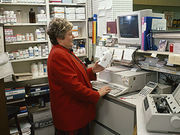Medication dosing errors are more common in pediatrics; manipulation of dosage form required
WEDNESDAY, May 2, 2018 (HealthDay News) — Board-certified pediatric pharmacists can have a significant impact on pediatric patients with their unique pharmacy needs, according to a report published in Drug Topics.
Noting that neonates, infants, children, and adolescents differ from adults anatomically, physiologically, immunologically, psychologically, developmentally, and metabolically, the report describes the unique challenges associated with pediatric pharmacy.
According to the article, pediatric patients have a higher risk of adverse drug events. Medication dosing errors are more common in pediatrics due to weight-based dosing calculations. In addition, as medications are usually formulated and packaged for adults, manipulation of the dosage form is required in order to administer the precise dose to the child. Furthermore, children may have difficulty communicating adverse medication-related events to providers.
Pediatric pharmacy was recognized as a specialty by the Board of Pharmacy Specialties in 2015. Becoming a board-certified specialist requires either completion of four years of practice in the pediatric setting or completion of a postgraduate year 1 (PGY1) residency in a pediatric setting, both with at least 50 percent of time spent in pediatric pharmacy activities, or completion of a specialty PGY2 residency in pediatric pharmacy. Board-certified pediatric pharmacists can collaborate with other pharmacists and health care providers to improve pediatric public health, including by improving health literacy, individualizing patient care plans, and ensuring optimal medication outcomes.
Copyright © 2018 HealthDay. All rights reserved.








